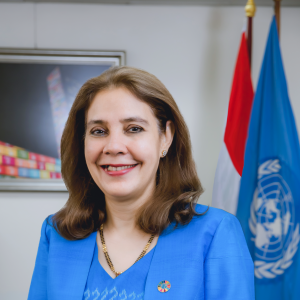Bapak Ateng Hartono, Deputy Head of Social Statistics BPS
Bapak Ali Said, Director for Population and Labor Statistics
ESCAP and UN colleagues
Selamat Pagi.
It is a pleasure to participate in this workshop to discuss, learn and collaborate to harness the full potential of administrative data for official statistics in Indonesia.
This workshop marks a pivotal moment in our collective efforts to improve one data and promote sustainable development.
Administrative data is a cornerstone of effective governance, providing invaluable insights into the dynamics of our society, which we need to leverage even more in the future.
The role of administrative data in achieving the Sustainable Development Goals (SDGs) cannot be overstated.
Accurate and timely data are essential for monitoring progress, identifying gaps, and making informed decisions that drive sustainable development.
Administrative data, routinely collected by governments and service providers, provides a rich and continuous source of information that can significantly enhance our ability to track the SDGs.
For example, administrative data can support more than half of the SDG indicators.
This includes critical areas under health, where in civil registration and health records can provide data on maternal mortality rates, disease prevalence, and access to health services.
Similarly, school enrolment records and education management information systems can track literacy rates, school attendance and educational attainment.
Business registration data can provide insights into employment trends, economic activity and workforce demographics, to inform SDG 8.
Social and tax records can help measure income distribution and the impact of social protection programmes to inform SDG 10.
In addition, the integration of big data with administrative data opens new avenues for innovation and insight.
I know BPS is the UN regional hub on big data and data science for Asia Pacific, supported by ESCAP and DESA.
BPS is currently engaged in the one rice data initiative with technical assistance of FAO and ESCAP to leverage Earth Observation Big Data and AI to pilot real-time rice production, distribution, and harvest.
As the methodology is finalised, this could be a big step forward in reducing cost and enhancing efficiency for BPS.
UN in Indonesia is committed to supporting this initiative and showcasing big data's benefits emerging from this across the region.
I would like to thank BPS-Statistics Indonesia, ESCAP and Statistics Norway for their technical assistance in organising this event.
As we embark on this journey, let us remember that the success of our efforts depends on the strength of our partnerships and our collective determination to innovate and adapt.
I am confident that the knowledge and experiences shared here will pave the way for a more robust and resilient statistical system in Indonesia.


















